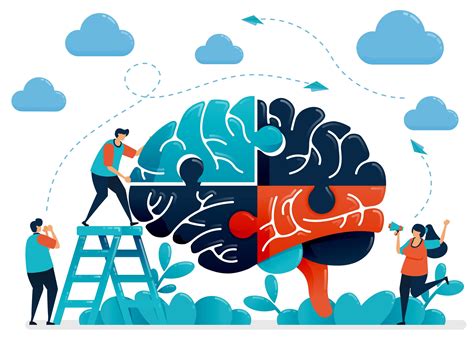Are you fascinated by the inner workings of the human mind? Do you find yourself intrigued by the mysteries behind perception, memory, and decision-making? If so, you may have the makings of a cognitive psychologist. In this blog post, we will delve into the captivating world of cognitive psychology, exploring the various subfields and topics that make up this intricate discipline. From understanding the basics of cognitive processes to unraveling the complexities of language and cognition, we will take a comprehensive look at the puzzles of the mind that cognitive psychologists strive to solve. Whether you’re a psychology enthusiast or simply curious about the workings of the human brain, join us as we unravel the mysteries of cognitive psychology and its practical applications in everyday life.
Table of Contents
Understanding Cognitive Psychology: An Introduction
Cognitive psychology is the study of mental processes such as attention, language use, perception, problem solving, memory, and thinking This field explores the internal mechanisms that are responsible for our actions, thoughts, and emotions. Cognitive psychology can be applicable in many different areas of life, such as understanding how we learn, make decisions, and solve problems, as well as how we perceive the world around us. It’s a fascinating field that provides a deeper understanding of the intricacies of the human mind.
One of the main goals of cognitive psychology is to understand how the mind works and how we can use this knowledge to improve our daily lives. By studying the cognitive processes that underlie our behavior, researchers can gain insights into how we learn, remember information, and make decisions. This knowledge has practical applications in education, mental health, and technology, among other areas.
As an introduction to cognitive psychology, it’s important to understand that this field is not just about abstract theories and research. It’s about how we use our brains in our daily lives, and how understanding cognitive processes can lead to real-world benefits. Whether it’s improving educational methods, developing more effective treatments for cognitive disorders, or optimizing technology to better suit human cognition, the study of cognitive psychology has the potential to make a meaningful impact on society.
As we delve deeper into the world of cognitive psychology, we’ll explore the various aspects of the mind’s puzzle, from perception and memory to language and problem solving. By gaining a better understanding of these cognitive processes, we can unlock the potential of the human mind and improve our quality of life.
Exploring the Mind’s Puzzle: The Cognitive Process
Cognitive psychology is a branch of psychology that focuses on the study of mental processes such as perception, attention, language, memory, problem-solving, reasoning, and decision-making, according to the American Psychological Association. The cognitive process involves the way in which information is perceived, processed, and stored in the mind. It is a fascinating area of study that seeks to understand the complex workings of the human mind.
One key aspect of the cognitive process is perception, which refers to the way in which individuals interpret and make sense of sensory information from their environment. The process of perception involves the brain’s ability to organize and interpret incoming sensory information, allowing individuals to make sense of the world around them.
Memory is another crucial element of the cognitive process. It involves the processes of encoding, storing, and retrieving information. In cognitive psychology, researchers seek to understand how memory works and how it can be improved or impaired. This area of study has practical applications in various fields, from education to healthcare.
Furthermore, the cognitive process is closely tied to problem-solving and decision-making. Cognitive psychologists study how individuals approach and solve problems, as well as how they make decisions based on the information available to them. Understanding these processes can provide valuable insights into human behavior and how individuals can make more effective choices in their everyday lives.
The Role of Perception in Cognitive Psychology
Perception plays a crucial role in cognitive psychology, as it is the process through which we interpret and make sense of the world around us. Our perception is influenced by a combination of sensory inputs, past experiences, and cultural factors, and it shapes the way we think, feel, and behave. In the context of cognitive psychology, perception is the foundation of our mental processes, influencing how we remember, understand, and interact with our environment.
In cognitive psychology, perception is studied as a complex process that involves the interpretation of sensory information, as well as the organization and integration of this information to form a coherent mental representation. Researchers in this field seek to understand the mechanisms behind different perceptual phenomena, such as visual illusions, depth perception, and auditory processing, and how they influence our cognitive abilities and decision-making processes.
Furthermore, our perceptual experiences are not always accurate representations of reality, as they can be influenced by biases, expectations, and emotional states. Cognitive psychologists are interested in studying these perceptual distortions and understanding how they can impact our mental functioning and behavior. By gaining insight into the role of perception in cognitive psychology, researchers can develop interventions to improve perceptual skills, correct misperceptions, and enhance cognitive abilities.
In conclusion, perception is a fundamental aspect of cognitive psychology, shaping how we make sense of the world and influencing our mental processes. By studying the role of perception, cognitive psychologists can gain valuable insights into the mechanisms underlying human cognition and behavior, ultimately contributing to the development of effective interventions and therapies for cognitive disorders and mental health issues.
Memory and Learning: Unraveling the Puzzle
Memory and learning are two essential components of the human cognitive process, and understanding how they work together can provide valuable insights into the workings of the mind. When we consider memory, we are looking at the processes involved in retaining and recalling information. This can include short-term memory, which holds onto information for a brief period, and long-term memory, which stores information for an extended period of time.
Learning, on the other hand, involves the acquisition of new knowledge and skills through experience, study, or exposure. This often involves the encoding of information into memory, creating connections and associations that allow for the retention and retrieval of that information. When we examine these two processes together, we begin to unravel the intricate puzzle of how our minds store and utilize information.
Research in cognitive psychology has provided valuable insights into the mechanisms behind memory and learning. For example, studies have shown that certain techniques, such as spaced repetition and elaborative rehearsal, can enhance the retention of information in memory. Likewise, our understanding of how learning occurs has been deepened by investigations into factors such as attention, motivation, and the role of emotions in the learning process.
Unraveling the puzzle of memory and learning can also have significant practical applications, particularly in educational settings. By understanding the cognitive processes involved in memory and learning, educators can develop more effective teaching strategies, including techniques for enhancing memory retention and promoting deeper learning. Additionally, a deeper understanding of memory and learning can have implications for fields such as rehabilitation and cognitive therapy, where interventions aimed at improving memory and learning abilities can have profound impacts on individuals’ quality of life. In conclusion, memory and learning are critical aspects of human cognition, and delving into the puzzle of how they work together can provide valuable insights into the workings of the mind and practical implications for everyday life.
Language and Cognition: Unlocking the Mind’s Code
Language and cognition are deeply intertwined, each playing a crucial role in shaping the other. Language, in its various forms, serves as the primary medium through which humans express thoughts, emotions, and ideas. Cognition, on the other hand, encompasses mental processes such as perception, memory, problem-solving, and decision-making. When combined, language and cognition form a powerful partnership that allows us to communicate, comprehend, and make sense of the world around us.
One of the key elements of language and cognition is the concept of semantics, which refers to the meaning behind words and symbols. This is where cognition comes into play, as our understanding of language relies heavily on our ability to process and interpret these meanings. From understanding the nuances of language to grasping the underlying intent behind a message, cognition plays a pivotal role in unlocking the intricate code of language.
Furthermore, the connection between language and cognition extends beyond mere communication. Our linguistic abilities affect our thought processes, influencing how we perceive the world and make decisions. This reciprocal relationship between language and cognition demonstrates the profound impact they have on each other, shaping our experiences and interactions on a daily basis.
In essence, language and cognition are not simply tools for expression and understanding, but rather the very building blocks of our mental frameworks. By delving into the intricate workings of language and cognition, we can gain a deeper appreciation for the complexity of the human mind and the remarkable ways in which we navigate the world around us.
Problem Solving and Decision Making: A Cognitive Approach
When faced with a problem or decision to make, our cognitive processes come into play, influencing the way we approach and solve the issue at hand. Cognitive psychology, the study of mental processes such as attention, language, memory, problem-solving, and decision-making, provides valuable insights into how our minds work in these situations.
One aspect of problem-solving from a cognitive approach is the use of mental models. Mental models are representations of the way things work, and they help us understand and solve problems by simulating different scenarios in our minds. By using mental models, we can better comprehend the potential outcomes of different decisions and choose the best course of action.
Another important factor in problem-solving and decision-making is the role of heuristics. Heuristics are mental shortcuts that help us make quick decisions based on limited information. While heuristics can be efficient, they can also lead to cognitive biases and errors. Understanding the various types of heuristics can help us become aware of our decision-making processes and improve our problem-solving skills.
In conclusion, by taking a cognitive approach to problem-solving and decision-making, we can gain a deeper understanding of the mental processes involved and improve our ability to tackle challenges and make sound decisions. By utilizing mental models and being aware of heuristics, we can enhance our problem-solving skills and make more informed choices in our daily lives.
Attention and Consciousness: Examining the Cognitive Puzzle
When we examine the role of attention and consciousness in the field of cognitive psychology, we are delving into the intricate workings of the human mind. Attention is the ability to focus on specific stimuli, whether they are external or internal, while consciousness encompasses an individual’s awareness and perception of their surroundings and internal thoughts.
Understanding how attention and consciousness operate is crucial in comprehending the cognitive puzzle that is the human mind. Attention is a selective process that allows us to filter out irrelevant information and concentrate on what is important, while consciousness enables us to be aware of our thoughts, feelings, and surroundings.
In cognitive psychology, the examination of attention and consciousness involves exploring how these functions interact and influence our perception, memory, problem-solving, and decision-making processes. By unraveling the complexities of attention and consciousness, researchers can gain insights into how these cognitive processes shape our experiences and behaviors.
As we continue to examine the cognitive puzzle of attention and consciousness, it becomes evident that these functions play pivotal roles in shaping our subjective experiences and understanding the workings of the human mind.
Developmental Cognitive Psychology: From Childhood to Adulthood
Understanding how the human mind develops from childhood to adulthood is a central focus of developmental cognitive psychology. This field of study explores the cognitive processes and abilities that change as people grow and mature, shedding light on the fascinating puzzle of the human mind’s development.
One of the key areas of interest within developmental cognitive psychology is the study of cognitive milestones that occur at different stages of life. From the development of basic sensory and perceptual abilities in infancy to the acquisition of higher-level thinking skills in adolescence, researchers strive to understand how cognitive abilities evolve over time.
Research in this field also delves into the various factors that can influence cognitive development, such as genetics, environment, and social interactions. By examining these influences, psychologists gain valuable insights into how and why cognitive abilities differ among individuals and cultures.
Ultimately, the study of developmental cognitive psychology offers a comprehensive understanding of how the human mind transforms and grows from childhood to adulthood, providing valuable knowledge for educators, parents, and mental health professionals.
Cognitive Disorders and Treatment: Solving Mental Puzzles
Dealing with cognitive disorders can be a complex and challenging experience for both the individuals affected and their loved ones. Conditions such as Alzheimer’s disease, dementia, and various forms of cognitive impairment can create significant obstacles to daily functioning and overall quality of life. It’s important to recognize the impact of these disorders and seek out effective treatment options to address the cognitive puzzles they present.
One of the key challenges in treating cognitive disorders is the wide range of symptoms and manifestations that can occur. From memory loss and confusion to changes in personality and behavior, these disorders can have a profound impact on an individual’s cognitive abilities and overall well-being. As a result, tailored treatment plans that address the specific needs and symptoms of each patient are essential in solving these mental puzzles.
While there is currently no cure for many cognitive disorders, there are various treatment strategies that can help manage symptoms and improve overall cognitive function. These may include medication, cognitive therapy, lifestyle modifications, and support services aimed at enhancing daily living skills and promoting independence. By addressing the puzzle of cognitive disorders from multiple angles, individuals and their caregivers can work towards achieving the highest possible quality of life.
It’s also important to recognize the importance of ongoing research and advancements in the field of cognitive disorders and treatment. As our understanding of the underlying mechanisms and potential interventions continues to evolve, there is hope for improved outcomes and support for individuals affected by these challenging conditions. By staying informed and engaged in the latest developments, we can all play a role in solving the mental puzzles of cognitive disorders and supporting those in need.
Applications of Cognitive Psychology in Everyday Life
Cognitive psychology is the study of mental processes such as attention, language use, perception, problem solving, memory, and thinking.Applications of cognitive psychology in everyday life can be seen in various areas such as education, healthcare, and technology. In education, cognitive psychology plays a significant role in understanding how students learn, retain information, and solve problems. By applying cognitive psychology principles, educators can develop effective teaching methods and strategies to enhance learning outcomes.
In healthcare, cognitive psychology is used to understand and treat mental health disorders such as depression, anxiety, and schizophrenia. Cognitive-behavioral therapy, which is based on the principles of cognitive psychology, is an effective treatment approach for addressing these disorders.
Technology also benefits from the applications of cognitive psychology. User experience design and interface design are influenced by cognitive psychology theories to create products and services that are intuitive, easy to use, and engaging for the users.
Furthermore, understanding cognitive psychology can help individuals improve their own cognitive abilities, such as memory, attention, and decision-making, in their daily lives. By applying cognitive strategies and techniques, people can enhance their productivity, problem-solving skills, and overall mental well-being.





